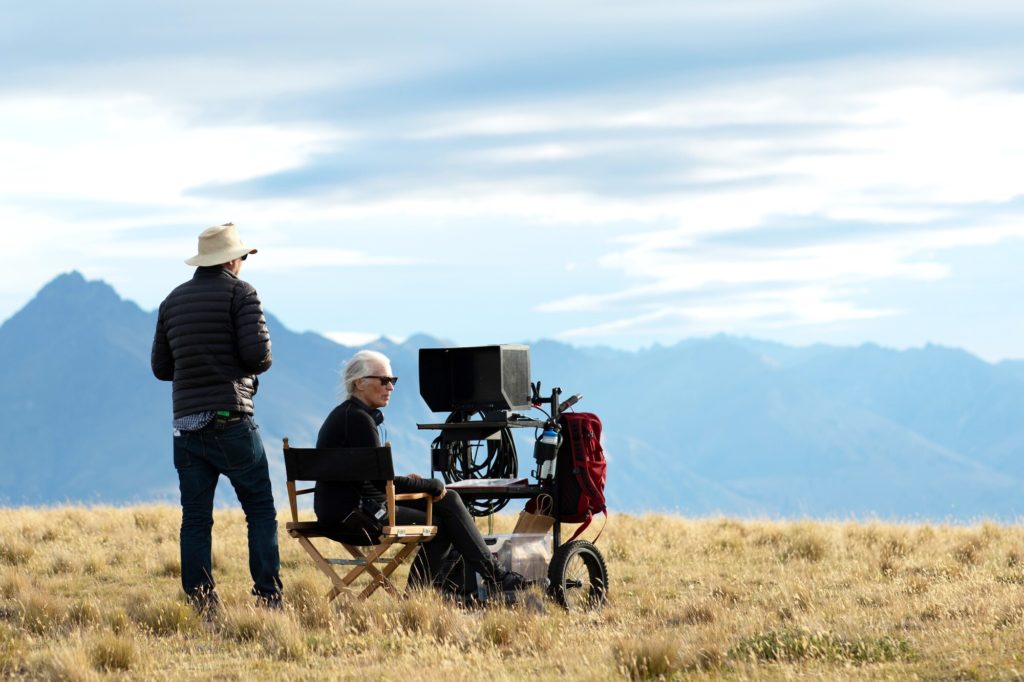By Anne Brodie – Jane Campion’s The Power of the Dog, based on Thomas Savage’s novel, dominates the awards season. To date, the film’s won 184 awards and 262 nominations and is the top contender for Best Picture. Benedict Cumberbatch and director-screenwriter Jane Campion have amassed dozens and awards seasons isn’t over yet. Campion recently talked about the film, her first in twelve years, as a personal change of direction and Cumberbatch whose searing portrayal of sociopathically cruel rancher Phil Burbank has stunned audiences. Campion spoke from her bedroom in New Zealand in advance of Netflix’s release of Behind The Scenes with Jane Campion on Jan 27.
You are known for telling women’s stories but The Power of the Dog is deeply male. Why the change?
My decisions seem to come from places I don’t really access. So when you fall in love with a piece of work, you like the story. At a certain point, I’m like, oh my goodness, this is interesting, it’s all about masculinity, not really my territory. I’ve been curious about that too, wondering how come. Everyone can be sensitive and there is freedom not to have to tell only women’s stories. Previously there was just not enough of them, and it felt like a betrayal to do anything else. Those brave, women and some men too worked and exposed themselves, to create a different cultural environment for women. I know it’s just begun and still, the numbers aren’t pleasing, but it doesn’t feel charitable anymore to work with a woman. It’s actually good business.
The Power of the Dog is an exploration of male homosexuality and brutality, set in the macho world of cattle ranching. How did you find it?
Thomas Savage who’s a queer man, um, wrote this amazing book that the work is adapted from. I just really love him and love his courage, love his particularity, love everything about who he really is. Love thinking about his character Phil Burbank’s relationship with (unseen) Bronco Henry, what it might really be. It brought me really into an imaginative space of what gay love would be. I think Bronco and Phil would have, could have had, an incredibly powerful, strong, beautiful relationship, a sexual relationship as well. And I enjoyed thinking about all those things, in those spaces.
These themes aren’t spoken but they’re in the details you created.
The night that the rope was finished, that was not explored in the book. That was just such an obvious scene that I just couldn’t wait to write and to film and make. What might have happened in that barn that night when they were, all those complicated meetings and so many important elements of the story, like the making of the rope, the finishing of the rope, which was so freighted with all different meanings. Rope is made from the animals bred on that land. But it’s also a symbol, especially for ranchers of masculinity and dominance, you know. Because you use that rope to get these animals into submission. It’s a real object of dominance. And now the rope becomes one of friendship and romantic friendship. But it’s also a weapon. It gets so freighted with different meanings. It becomes a complete symbol for the entire story in a way because of the four threads of the rope. Even though they don’t necessarily appear on the surface or to everybody. It really strengthens things and that rope goes under Peter’s bed. And you realize that Phil now is his Bronco Henry and his erotic object.
How did you get Benedict Cumberbatch?
I knew that anyone who was gonna really do a good job with Phil Burbank would have to put an enormous amount of work in to find him, and if they weren’t already good horse rider, or didn’t grow up on a ranch like Jesse Plemons did put that time into make all that stuff feel second nature or first nature. He had to have an intellectual capacity, because Phil Burbank was also university-educated, even though he loved to fake different commonplace dialects. He could read Greek and Latin, so it was a big job, it was a really big task. And it was really, um, hard in Hollywood.

When I met Benedict, I broached the subject, you know this is going to take a lot of time. Have you got that time? You’re going to have to do work on a ranch in Montana. You’re going to have to learn so many things. Horse riding’s not something you learn instantly. Everything’s gonna take a lot from you, plus, it’s a really deep and dark place to go. And I think that’s a whole other exploration that we have to figure out. I think all those challenges excited him.
How did you and Benedict start the journey?
I know how things work in the brain. That the brain, it’s working without you even being there, you know? He’s starting to think about it. You’ve earned a little space in his thinking, and his psyche. That is already gonna spawn all sorts of interesting material, you need to know what it is. We went down to the Portrait Gallery in London. Benedict organized it, which is very sweet of him to do before the public came in. We were just going through the gallery looking for who we thought was Phil or Bronco Henry, or the other characters. It was a game we played together. And we found a painting by Sigmund Freud of a really arrogant looking guy with his head up like that, a nude, I think, actually. And it was really instrumental. I carried an image from that in my folder just to remember him.
Netflix’s Behind The Scenes with Jane Campion debuts Jan. 27.